
The Sherrif Security Indicator (TSSI) is an annual online survey that is organized to commemorate the Cyber Security Awareness Month. TSSI researches into the most critical security concerns of residents of Ghana. This is the fourth edition of the survey.
TSSI asks respondents to indicate their greatest and least security concerns from a list of security threats including the following: disaster/epidemic, hacking, identity theft, inability to meet financial obligations, mobile money fraud, payment card fraud, personal safety, security of online banking/shopping, and national security.
Respondents in this year’s survey rated their inability to meet their financial obligations as their greatest security concern, whilst they rated mobile money fraud as their least security concern.
Methodology
The survey was conducted using Google Forms, which was shared with residents of Ghana via social media and email.
The survey was conducted for a period of 7 weeks; from 2nd September 2023 to 19th October 2023. Out of the approximately 1,900 persons targeted for this study, 364 responses were received.
The respondents were asked the following questions:
- What is your gender?
- What is your age range?
- What is your highest level of education?
- Which of the 9 security factors is of greatest concern to you?
- Which of the 9 security factors is of least concern to you?
Result from the survey was analysed using statistical software.
Results
This section discusses the respondents’ responses to the 5 aforementioned questions. Each subsection addresses each of the responses.
Gender
Majority of the 364 respondents were males. Females constituted 27% of the respondents, as shown in figure 1.
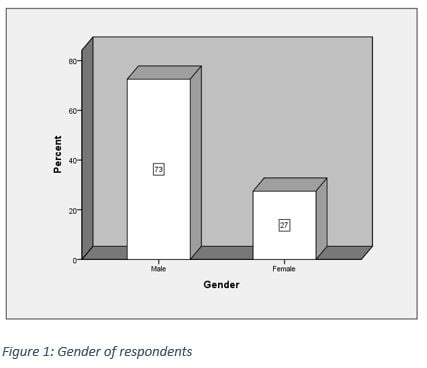
Age
Majority of the respondents were between age 36-45, whilst there was only one respondent below 18 years. Figure 2 provides the detailed age distribution.
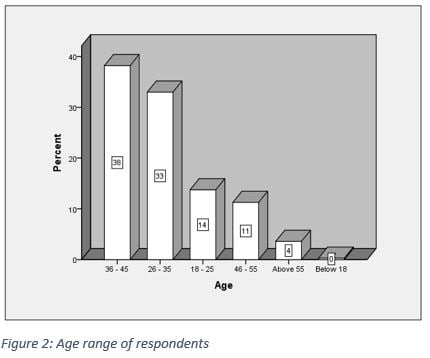
Educational level
Vast majority of the respondents (88%) had tertiary education, whilst only 1% had no formal education. Figure 3 provides the detailed educational qualifications of the respondents.
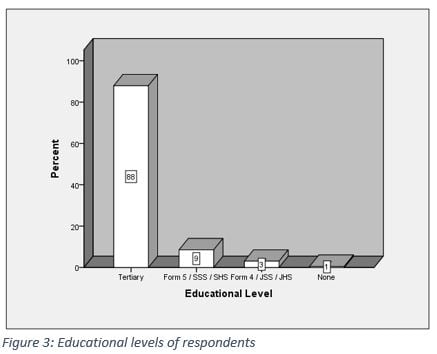
Greatest security concern
Cumulatively (i.e irrespective of the demographics), majority of the respondents ranked their inability to meet their financial obligations as their greatest security concern, among the 9 security threats. This was followed closely by their personal safety, and national security. Figure 4 provides the detailed responses.
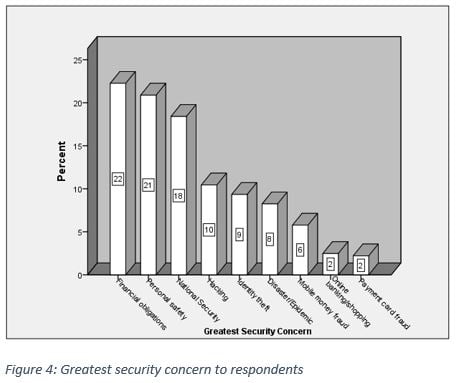
In segregating the responses by gender, majority of the males ranked their inability to meet their financial obligations as their greatest security concern, followed by their personal safety, and national security. On the contrary, the greatest security concern for the females was their personal safety, followed by hacking of their accounts/systems, and their inability to meet their financial obligations.
The greatest security concern of the majority of the respondents between age 18-25 was their inability to meet their financial obligations, followed by disaster/epidemics. Those between age 26-35 indicated their personal safety as their greatest security concern, followed by their inability to meet their financial obligations. Those between age 36-45 indicated their personal safety as their greatest security concern, followed by national security. Those between age 46-55 indicated their inability to meet their financial obligations as their greatest security concern, followed by national security. Those above 55 years indicated their personal safety as the greatest security concern, followed by national security.
Least security concern
Cumulatively, majority of the respondents ranked mobile money fraud as their least security concern, followed by disaster/epidemic, and payment card fraud. Figure 5 provides the detailed responses.
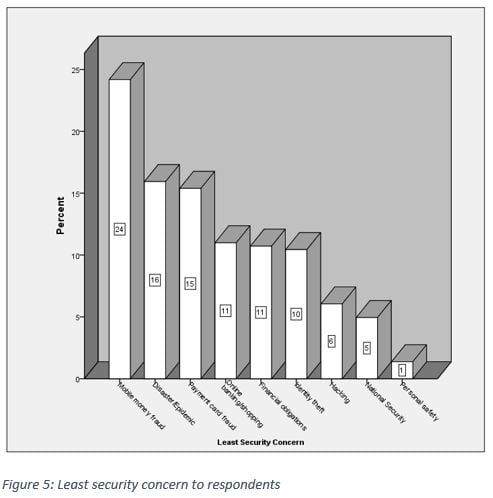
Majority of the males ranked mobile money fraud as their least security concern, followed by payment card fraud, and disaster/epidemic. Their female counterparts also ranked mobile money fraud as their least security concern, followed by their inability to meet their financial obligations, and identity theft.
The least security concern of the majority of the respondents between age 18-25 and 26-35 were mobile money fraud, followed by disaster/epidemics. Those between age 36-45 also indicated mobile money fraud as their least security concern, followed by payment card fraud. Those between age 46-55 indicated their inability to meet their financial obligations as their least security concern, followed by mobile money fraud. Those above 55 years indicated disaster/epidemics, mobile money fraud, and payment card fraud (all in the same position) as their least security concern.
Analysis
Although numerous analysis could be drawn from the findings of the survey, this article focuses on a few of interest.
The findings indicate that, out of the 9 security threats, the respondents’ inability to meet their financial obligations was their greatest security concern. It is evident that gender and age of the respondents influence their security concerns. Males were most concerned about their inability to meet their financial obligations, whilst females were most concerned about their personal safety. Personal safety was the greatest security concern of those between age 26-45, and those above 55 years. However, the greatest security concern of those between age 18-25 and 46-55 was their inability to meet their financial obligations.
Mobile money fraud was of least concern to all the respondents. Gender had no influence on the respondents’ least security concern, as both males and females ranked mobile money fraud as their least security concern. Age on the other hand, had influence on the least security concerns of the respondents. Those between age 18-45, and above 55 years indicated mobile money fraud as their least security concern, whilst their counterparts between age 46-55 indicated their inability to meet their financial obligations as their least security concern.
It is also evident from the findings that, information security related issues like hacking, mobile money fraud, online banking/shopping fraud, identity theft, and payment card fraud were of least concern to the respondents.
Constraints
Due to the medium used to administer the survey, the views of individuals without access to smartphones, computers and internet could not be solicited.
Conclusion
The three greatest security concerns from last year’s survey – personal safety, inability to meet financial obligations, and national security, remain same for this year. However, inability to meet financial obligations moved from the 2nd position to number 1 this year. Compared to last year’s survey, mobile money fraud remains the least security concern of the respondents.
This year’s findings clearly demonstrate the importance of financial security, against information security, in the lives of the respondents. Information security is considered the least concern, as 2 out of the 3 least security concerns (mobile money fraud and payment card fraud) are information security related.
We are very grateful to the respondents and all those who have been supporting the survey in diverse ways. We count on your continuous support, and may the almighty Allah bless you abundantly.
Author: SHERRIF ISSAH (Information Security Governance, Risk and Compliance Professional, and Director of Information Security and Data Protection, IIPGH)
For comments, contact author mysherrif@gmail.com | +233243835912









